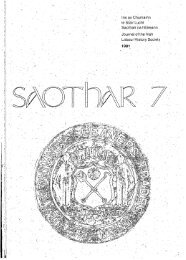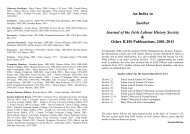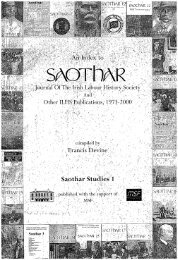'A Passage To Britain': Seasonal Migration andSocial Change in the West of Ireland, 1870-1890Gerard MoranThroughout the nineteenth century the labourer endured a most precarious existence within Irishsociety: the problems of famine, changing agricultural patterns and fluctuating economic circumstancescombined to drive him to the edge of extinction. Juxtaposed with the fate of the labourer wasthatofthe small tenant farmer. This was especiillly so along the western seaboard, where tenant farmersfound it increasingly difficult, for similar reasons, to survive on their holdings. It became imperativethat these men obtain additional income. Gradually, more and more came to depend on income derivedfrom a new source - seasonal migration.This phenomenon had two forms; migration to another part of Ireland (internal migration) andmigration to Britain (external migration). Itis the latter form which was of most concern to the peopleof the west of Ireland. As insufficient evidence exists to ascertain the extent of internal migration, itis difficult to quantify the numbers whose survival depended on this process. The extent of hiring fairsin Kerry, east Cork, east Donegal, east Galway and Tyrone, indicates that internal migration was asextensive as external migration. We are fortunate in having an insight into the conditions of thesemigrants in the works of the writer, Patrick McGill. What is clear is that few parts of the countryremained unaffected by seasonal migration, either as a recipient or donor of a transient labour force.It was not uncommon for agricultural labourers to traverse distances of up to twenty miles on footto attend hiring fairs at centres such as Letterkenny and Strabane. 1 Failure to obtain work at one centrenormally resulted in a trek to the next fair and such instances eventually led to a lowering of wagesamongst the migrants. This internal migratibn was very often the precursor of an external migrationto Britain, especially from Donegal. Often the final element of this triad was permanent emigration.The season of the migrant usually commenced with a mass departure oflabourers around April, Mayand June. Most migrants from west Mayo left on 9 June, the day after Newport fair. Here they wouldhave sold their produce to buy fares to Britain. The migrant would then return the following Septemberor October with money to pay the rent or to purchase conacre. 2 Prior to departure, the migrant planteda crop, usually potatoes, which then fed the family during their winter in Ireland. The importance ofthe whole family in the process mustbe noted in that, in the migrant's abserice, the other memberstended the crop and on his return the migrant harvested it. It was inevitable that the inexperience of thewomen and children in agricultural techniques resulted in lower output within those regions with highlevels of seasonal migration. 3Finance and communications determined the destination of the migrants. It was for exampleexpedient, and indeed cheaper, for the Achill and Newport migrants to leave from Westport, rather thantravel to Dublin first. Compared to the boat/train cost of £2.10/- from west Mayo via Dublin, the returnfare from Westport or DenY io Scotland was a mere 5/- on the cargo ships.4 For many migrants,especially in inaccessible districts, transport by rail was not even an option due to distances from railwaystations.Despite the major advances in rail construction in the west of Ireland from the 1860s, the moreremote regions were not incorporated into the transport network by the Congested Districts Board untilthe 1890s. Under such circumstances many migrants had to walk up to thirty miles to an embarkationpoint, as in the case with Ballycroy migrants in west Mayo, who walked to the port of Sligo. Theexpansion of the railway system in the last quarter of the nineteenth century enabled migrants to utilisethe railways to a much greater degree. .The importance of the seasonal migration custom was recognised quickly by the railway companies22
,'-,;-''''.A PASSAGE TO BRITAIN 23COUNTY BOUNDARIESPOOR LAW UNION BOUNDARIESCounties Mayo, Sligo, Roscommon, Leitrim and Donegaland a spe,cial fourth class passage was provided during those periods of the year when the level ofmigration was highest. Finance rather than philanthropy governed the attitude of the railway companies.There were constant complaints about the service and facilities provided, especially against theMidland Great Western Railway Company. The rail companies did, however, respond. In 1879 westof Ireland migrants were granted a thirty-five per cent farereduction. 5Despite these concessions, passage to Britain put a financial burden on many families. It alsohighlighted the working of the credit system within the community, and in particular the importanceof the shopkeeper in providing loans to migrants. The shopkeeper was important in providing creditnot alone during periods of distress, but also on a regular basis for needs such as seasonal migration.This role of shopkeepers m ust be regarded as a necessary evil as the absence of banks resulted in their"being the only source of credit. They extracted a heavy price. Credit placed the people in thestranglehold of the shopkeepers, a point that was noted in 1880 by Captain Spaight, a local governmentboard inspector: :Once they get any of these people into their books, they never let them out of theirpockets till they have all that can be got out of them.'6In most ofthe incidences Spaight had come across, shopkeepers arrang~ for all migrant remittancesto come through them and the money was paid back with heavy interest. Without credit, however, itismore than probable that the majority of m igrants would have been unable to travel to Britain in searchof work. At the same time dependence.on credit was great and the pitfalls obvious, as the migrant'swelfare was associated closely with the shopkeepers' ability to extend credit. During the distress of1879"80 c"redit was not available and the migrants suffered great hardship. A deputation of tenants fromthe Aughagower area, near Westport, sought relieffrom the Westport Guardians. They stated that in
- Page 1 and 2: JOURNAL OF THE IRISH LABOUR HISTORY
- Page 3 and 4: ContentsPageEditorial: Labour Histo
- Page 5 and 6: EDITORIAL 3freedom to participate i
- Page 7 and 8: CorrespondenceThe Irish Labour Part
- Page 9 and 10: ; ~ ; ,The Decline and Fall of Donn
- Page 11 and 12: THE DECLINE AND FALL OF DONNYBROOK
- Page 13 and 14: THE DECLINE AND FALL OF DONNYBROOK
- Page 15 and 16: ·' THE DECLINE AND FALL OF DONNYBR
- Page 17 and 18: THE DECLINE AND FALL OF DONNYBROOK
- Page 19 and 20: THE DECLINE AND FALL OF DONNYBROOK
- Page 21 and 22: THE DECLINE AND FALL OF DONNYBROOK
- Page 23: THE DECLINE AND FALL OF DONNYBROOK
- Page 27 and 28: A PASSAGE TO BRITAIN 25only in the
- Page 29 and 30: A PASSAGE TO BRITAIN 27clothing._De
- Page 31 and 32: A PASSAGE TO BRITAIN 29established
- Page 33 and 34: ;:-.",.- .. .", ...... '.:. '
- Page 35 and 36: LOUIE BENNETI 33feminist movement w
- Page 37 and 38: :... ~: ."
- Page 39 and 40: -.- '.LOUlE BENNETT 37While there i
- Page 41 and 42: LOUIE ~ENNEIT 39Xl's encyclical Qua
- Page 43 and 44: LOUIE BENNEIT 41Bennett's own relat
- Page 45 and 46: LODIE BENNETT 43109; IWWU resolutio
- Page 47 and 48: Essays in ReviewCosherers, Wanderer
- Page 49 and 50: ••• .".'. >. '~"ESSA YS IN RE
- Page 51 and 52: ESSAYS IN REVIEW 49ConnolIy:Myth an
- Page 53 and 54: ESSAYS IN ~EVIEW 51tion' in the Int
- Page 55 and 56: ESSAYS IN REVIEW53International:'I
- Page 57 and 58: REVIEWScontroversy is real history.
- Page 59 and 60: REVIEWSJoe Monks was among the earl
- Page 61 and 62: REVIEWSnolly-Column Song','Proudly
- Page 63 and 64: REVIEWSresulting from the arrival o
- Page 65 and 66: REVIEWS,63the book by means of an a
- Page 67 and 68: REVIEWSlogue, it is hardly surprisi
- Page 69 and 70: The Team For All Workers ...CULIAIB
- Page 71 and 72: ESSAYS 69mission and moral refonn.l
- Page 73 and 74: .. ...... ~.~ -~ .'- '.ESSAYS. 71fr
- Page 75 and 76:
ESSAYS 73claimed authority but whic
- Page 77 and 78:
ESSAYS 75provided the basis for soc
- Page 79 and 80:
ESSAYS 779. For comparisons see E.T
- Page 81 and 82:
ESSAYS 7952. Annals of Christ Churc
- Page 83 and 84:
ESSAYS' 81Fianna Fail and the Worki
- Page 85 and 86:
ESSAYS 83Eireann in 1925 visibly di
- Page 87 and 88:
ESSAYS 85recognition of the impract
- Page 89 and 90:
ESSAYS 871970, it created the condi
- Page 91 and 92:
ESSAYS89The Irish Immigrants' Contr
- Page 93 and 94:
ESSAYS" 91Although anti -Catholic p
- Page 95 and 96:
ESSAYS 93McCowie played a key role
- Page 97 and 98:
:. -,,'.' ',. .~.,:.ESSAYS 95Althou
- Page 99 and 100:
ESSAYS 97young girl of their own ba
- Page 101 and 102:
SourcesIrish Labour History Society
- Page 103 and 104:
SOURCES 101INovember, 1971 to no. 1
- Page 105 and 106:
SOURCES 103would claim credit for t
- Page 107 and 108:
SOURCES105Sources for Irish Labour
- Page 109 and 110:
SOURCES 107NorthWest Archives and L
- Page 111 and 112:
SOURCES 109In 1966 the Finnish gove
- Page 113 and 114:
TURNINGANEWLEAFThe CPSSUis the larg
- Page 115 and 116:
REMINISCENCE 113us due to my politi
- Page 117 and 118:
REMINISCENCE 115when Jim was presen
- Page 119 and 120:
REMINISCENCE 117of Dail Eireann. 17
- Page 121 and 122:
REMINISCENCE 119NotesThe above arti
- Page 123 and 124:
DOCUMENT STUDY 121James Connolly in
- Page 125 and 126:
DOCUMENT STUDY123SOCIAL DEMOCRATIC
- Page 127 and 128:
DOCUMENT STUDY 125proletariat of th
- Page 129 and 130:
DOCUMENT STUDY 127the support of Je
- Page 131 and 132:
DOCUMENT STUDY 12926. The Workers'
- Page 133 and 134:
131BibliographyA Bibliography of Ir
- Page 135 and 136:
BIBLIOGRAPHY 133Compton, P.A. Demog
- Page 137 and 138:
BIBLIOGRAPHY 135Levine, I. and Madd
- Page 139 and 140:
BIBLIOGRAPHY 137Turner, M. 'Towards
- Page 141 and 142:
BIBLIOGRAPHY 1394. Land and Agricul
- Page 143 and 144:
BIBLIOGRAPHY 141Clogher Record12 (2
- Page 145 and 146:
BIBLIOGRAPHY 143Political Research
- Page 147 and 148:
BIBLIOGRAPHY 145Pres, 1987.O'Brien,
- Page 149 and 150:
147Notes on Contributorsf onathanBe
- Page 151 and 152:
1901: Ireland's first general union
- Page 153 and 154:
ELECTRICAL TRADES UNION .Establishe





